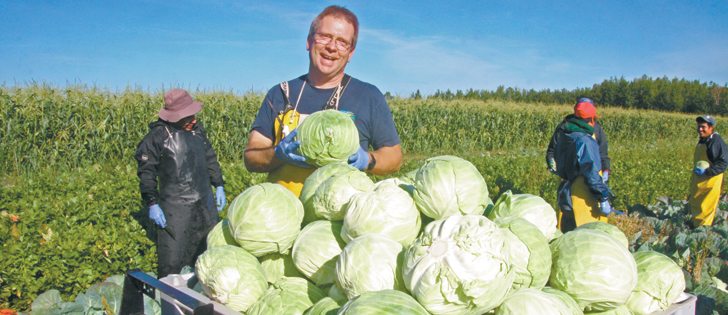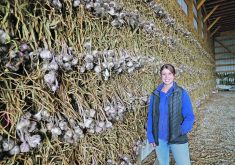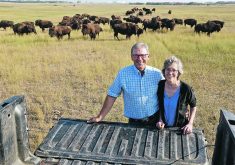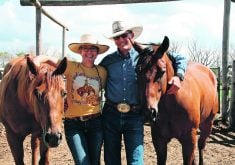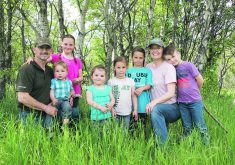VIMY, Alta. — Coloured cauliflower is in and kale is out, say produce growers Ron and Wendy Erdmann.
They, with their sons, Cody and Shane, operate Erdmann Gardens and Greenhouses in Alberta’s Westlock County.
The family must keep abreast of people’s eating habits and plant accordingly each year. Next spring, the Erdmanns will drop their kale acreage by half.
A host of vegetables and bedding plants grow inside greenhouses and on 60 acres of gardens for direct marketing to consumers here and at four farmers markets each week.
Read Also

Farmland ownership fires up Saskatchewan politicians
Saskatchewan politicians debate the enforcement of farmland ownership laws in the province.
“We put it right in the hands of the end user,” said Ron, who added the business benefits from the person-to-person contact.
He said margins are better in direct marketing, which allows them to control production from start to finish.
“We get to try different varieties to see what grows good, fine tune it to see what grows well at our location.”
Ron said farming runs in the family. The land was once a hay field for the family’s cattle when Ron’s father worked in construction.
“I just like growing,” he said.
Wendy said their soil is sandy, so last year’s drought was a challenge while this year’s abundant rainfall was manageable. The farm’s southern exposure also warms the land earlier in the spring.
They start planting cabbage, carrots, corn and potatoes around the May long weekend and later transplant what is started in the greenhouses.
Water is drawn from the Redwater River for their sprinkler irrigators.
Wendy said they buy Proven Winners cuttings from licensed propagators through a broker.
“We are allowed to sell these plants but can’t take cuttings,” she said. “We are a retailer, not a propagator.”
They have a large shed for processing and storing produce and have participated in Canada Gap’s on-farm food safety programs.
“It’s a lot of paperwork, record keeping and hand washing,” said Wendy. “It’s a lot of what we do already, but not documenting.”
Much of the weeding is done by hand. There is little they can do to keep predators out of the gardens, but they use biological sprays to control bugs on produce such as cabbage.
“We are not organic, but some of our practices are,” said Wendy, whose operation was recognized by Growth Alberta with a 2009 Business Excellence Award.
They have cut back their farmers market participation in recent years to four times a week.
“The pace was a little too crazy,” Ron said.
“You neglect things at home.”
Instead, they have taken on supplying more to food service and are looking to a new venture selling to Federated Co-operatives Ltd.
Ron said the Alberta economy’s downturn has significantly affected the food service market. They supply Edmonton’s Northlands, storing root crops for those markets when things are slower through the winter months.
“It helps keep Shane and Cody employed and keeps revenue coming in,” said Ron.
Local labour was hit and miss in the past, so they successfully took on seasonal workers from Mexico.
“They do a really good job,” said Ron. “We want workers who would show up and work and not have issues.”
Horticulture is labour intensive, so time away from the operation normally means attending a vegetable conference, the Erdmanns said.
“We have a goal to get away more,” said Ron.
Theirs sons have long been active in the business and expressed their interest in continuing.
“You feel good about it, growing food and feeding people,” said Cody, who took a production horticulture course at Olds College in Olds, Alta.
Shane studied agriculture management and has found those programs to be useful on the farm.
“We have to get the young brains involved to be more efficient,” Ron said.
Cody sees expansion in the farm’s future, but the Erdmanns are waiting to see the effect of Bill 6 on their farm. The Alberta legislation will bring protection and compensation of non-family farm and ranch employees into line with what’s already extended to others in the general workforce.
“One size does not fit all,” Shane said. “There are different labour requirements for every farm.”
Wendy said the bill, which is now undergoing public consultations, could significantly affect their business.
“Bill 6 could throw a loop into what we do,” she said, noting labour costs could increase by as much as 40 percent.
Ron has served on the Alberta Farm Fresh Producers board, which increases awareness of the industry and keeps government informed of its issues.
“A lot don’t realize what we can grow in Alberta,” said Ron.

